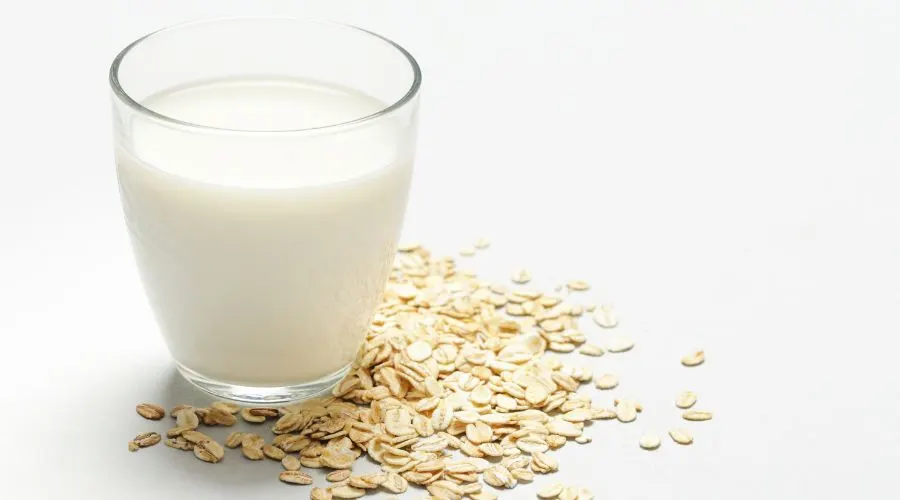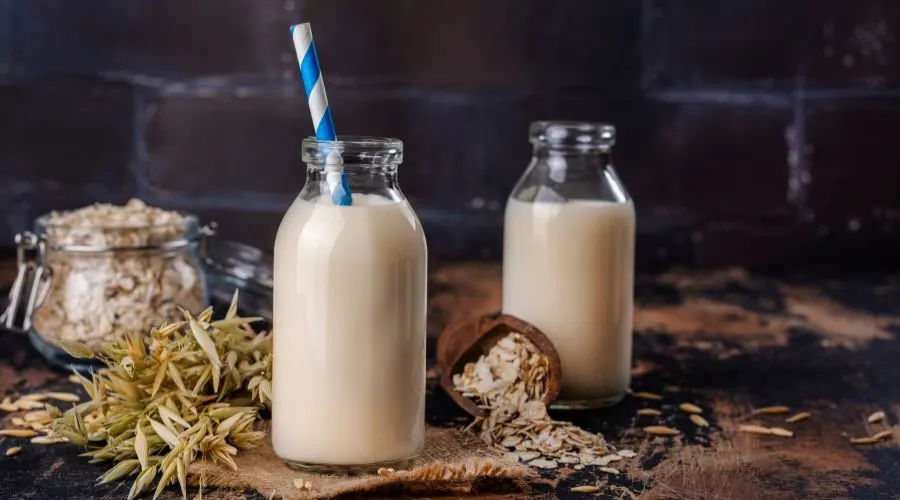These days there are many dairy milk alternatives to choose from, but are they any better than cow’s milk when it comes to calorie content and nutrition?
In this article, we’re focusing on the calorie content of oat milk, which is one of the higher-calorie dairy milk alternatives you can choose.
Oat milk calories vary depending on the brand and ingredients but using an average, a cup of light oat milk (weighing 240ml/8oz) contains 100 calories (in kcal) and the same serving of original oat milk contains 120 calories.
There are also extra creamy and barista options to consider, so read on to find specific oat milk calories for your type and brand, or use our calculator to work out the calories of any serving.

Information In This Article
Use the links below to jump to the relevant section:
Oat Milk Calories Per Serving
The table below shows the average calorie values for various servings of unsweetened, original, extra creamy, and barista oat milk.
Please note that oat milk calorie values can vary depending on the brand, see below for brand-specific calorie values.
| Oat Milk Type | Average calories per 100ml | Average calories per 240ml/8oz cup |
| Light (or no sugar oat milk) | 42kcal | 100kcal |
| Original oat milk | 50kcal | 120kcal |
| Extra creamy oat milk | 54kcal | 130kcal |
| Barista-style oat milk | 63kcal | 150kcal |
Oat Milk Serving Weight
The USDA recommended serving of oat milk is one cup which weighs eight ounces or 244g per serving, but most oat milk nutritional labels are in milliliters which confirms that one cup serving is equal to 240ml.
A 240ml serving of original oat milk contains an average of 120 calories (in kcal) and a serving of light oat milk contains an average of 100 calories per serving.
Oat Milk Calorie Calculator
The calculator below will help you to calculate the calories of any serving weight of oat milk (light, original, extra-creamy, or barista).
Select your milk type, and weight preference and input the weight to get started (use a decimal weight for ounce and cup weights, for example, 6.5):
Please note that the values in this calculator are based on averages and calories might vary slightly depending on the brand. See below for more information on brand-specific calorie values.

Oat Milk Calories Vs Dairy
There are many reasons why people switch from cow’s milk to a plant-based alternative milk, but if it’s to save calories, there’s not much of a saving swapping dairy for oat milk.
The average lighter oat option contains 100kcal which is more than skim cow’s milk, regular oat milk contains the same calories as 2% fat cow’s milk and whole cow’s milk contains just 16 more calories than creamy oat milk.
- Light oat milk 100kcal per cup – skim cow’s milk 82kcal per cup
- Regular oat milk 120kcal per cup – 2% fat cow’s milk 120kcal per cup
- Extra creamy oat milk – 130kcal per cup – whole cow’s milk 146kcal per cup
There is some creamier barista-style oat milk that contains 180 calories per cup, which is more than full-fat cow’s milk.
Oat Milk Calorie Chart
The quick reference chart below will help you to convert various weights of oat milk, along with the calories per serving for light and regular (original) oat milk.
This data is based on average figures and using the assumption that light oat milk contains 42kcal per 100g (0.42kcal per ml) and Regular (sweetened) oat milk contains 50kcal per 100ml (0.5kcal per gram).
| Serving weight | Light/no sugar Oat Milk Calories Per Serving | Regular/Sweetened Oat Milk Calories Per Serving |
| 100ml | 42kcal | 50kcal |
| 150ml | 63kcal | 75kcal |
| 200ml | 84kcal | 100kcal |
| 250ml | 105kcal | 125kcal |
| 300ml | 126kcal | 150kcal |
| 350ml | 143kcal | 175kcal |
| 400ml | 168kcal | 200kcal |
| 450ml | 189kcal | 225kcal |
| 500ml | 210kcal | 250kcal |
| 1 fl oz | 13kcal | 15kcal |
| 2 fl oz | 25kcal | 30kcal |
| 3 fl oz | 38kcal | 45kcal |
| 4 fl oz | 50kcal | 60kcal |
| 5 fl oz | 63kcal | 75kcal |
| 6 fl oz | 75kcal | 90kcal |
| 7 fl oz | 88kcal | 105kcal |
| 8 fl oz | 100kcal | 120kcal |
| 9 fl oz | 113kcal | 135kcal |
| 10 fl oz | 125kcal | 150kcal |
Oat Milk Calories By Brand And Type
Each brand and type of oat milk has a different recipe and therefore a different calorie value per serving, depending on added ingredients such as sugar.
The table below shows a calorie comparison between some of the most popular brands and types of oat milk.
| Oat Milk Brand & Type | Serving Weight | Calories Per Serving |
| Oatly Original Oat Milk | One cup / 240ml | 120kcal |
| Oatly Full Fat Oat Milk | One cup / 240ml | 160kcal |
| Oatly Barista Sugar-Free Oat Milk | One cup / 240ml | 140kcal |
| Oatly Original Chocolate Oat Milk | One cup / 240ml | 150kcal |
| Califia Farms Extra Creamy Oat Milk | One cup / 240ml | 110kcal |
| Califia Farms Zero Sugar Oat Milk | One cup / 240ml | 100kcal |
| Califia Farms Barista Oat Milk | One cup / 240ml | 130kcal |
| Oatsome Organic Oat Milk | One cup / 240ml | 130kcal |
| Oatsome Organic Barista Oat Milk | One cup / 240ml | 180kcal |
| Dream Original Oat Milk | One cup / 240ml | 120kcal |
| Dream Unsweetened Oat Milk | One cup / 240ml | 70kcal |
| Pacific Foods Organic Original Oat Milk | One cup / 240ml | 130kcal |
| Pacific Foods Organic Vanilla Oat Milk | One cup / 240ml | 130kcal |
| Pacific Foods Organic Barista Oat Milk | One cup / 240ml | 180kcal |
| Great Value Extra Creamy Oat Milk | One cup / 240ml | 120kcal |
| Great Value Original Oat Milk | One cup / 240ml | 100kcal |
More Oat Milk Calorie FAQs
Oat milk calories can vary between brands, but the average calorie value for 100ml of unsweetened oat milk is 42kcal and 50kcal for 100ml of sweetened oat milk.
An average cup of sweetened oat milk contains about 100kcal (depending on the brand) and a cup of unsweetened oat milk contains 120kcal, so the difference between the two is 20kcal. Barista-style oat milk is typically higher in calories at 150kcal per cup.
Related Articles
This article is part of a series of helpful articles on milk weights, servings, calories, and comparisons – you might also find the following articles useful:
Lowest calorie milk (with milk alternatives & calculator)
How Much Is A Serving Of Almond Milk? (With Calculator)
Should You Weigh Eggs When You’re Baking a Cake?
References Used for this Article
To ensure the nutritional information used in this article is accurate, I have used data from USDA FoodData Central; the links below contain the source information:
